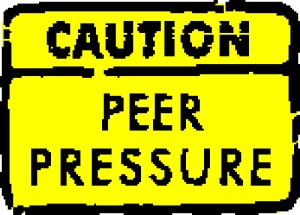Thinking. Peer Pressure part 4

Understand the pressure and its consequences
Some of the typical peer pressures that teenagers face are drugs, tobacco, alcohol, sex, dangerous driving and going underage to public venues.
I’ve often wondered why young people don’t feel pressured to do things like, say, lawn bowls or ballroom dancing. I think it’s because of two things. One is the risk factor. The other is the way some things affect our bodies and heighten our emotions and sensations. Both make us feel absolutely, gloriously alive.
Dangerous driving, being under-age and sneaking out of school to smoke are all risky activities. You might get caught, or hurt, or arrested. Taking the risk is what it’s about. Doing something dangerous gives us a shot of adrenalin through our body. It’s a buzz, it’s a rush and it’s addictive.
Taking drugs, drinking and having sex also give us a rush and a buzz. Being high, or totally without inhibitions or turned on is something that feels so great that we just can’t understand why you wouldn’t want to do it all the time.
Feeling the extent of our body’s capacity for emotions and sensations is one of the wonderful things of being a teenager. It’s true that as people get older, they do seem to feel things less intensely. Teenagers have an amazing gift for appreciating the vividness and sparkliness of life.
So if it feels so good to do these things, why do all the adults tell you to ‘just say no’, ‘don’t go’, ‘avoid temptation’ and all the rest of it?
Let’s take a look at drugs. Basically, they fry your brain. Don’t forget, your brain is still growing and developing. Recent studies show that it happens right up until the age of about 25. You can do your own research on the effect different drugs have on you, but what you’ll find out is that none of them are good for you. Add to that the fact that the majority or drugs are addictive and there’s the potential for a nice little habit which will eat your time, your money and your relationships alive. Interestingly, many people with a diagnosis of schizophrenia have a background with drugs.
No-one argues that tobacco is harmless any more. Everyone knows the potential health risks, and everyone knows that it is addictive. You’d have to be a fool to smoke, so why bother trying it?
What about alcohol? Binge drinking is terrible for your health and bad for society. It can poison your liver, affect your brain development and potentially lead to alcoholism. Drinking to excess leads to fights and violence, public humiliation, and unwanted sex. Governments all over the world are counting the cost of young people drinking too much. And driving while under the influence is a car accident waiting to happen.
Sex. I’ve written a whole chapter on it already, so go back and read it. When used in the wrong way, it can lead to disillusionment, self-loathing, regrets, unwanted pregnancy, sexually transmitted diseases and dissociation between body and soul.
Driving dangerously and taking crazy risks can kill you. You might feel invulnerable, like nothing could happen to you, but it’s easy enough to become a dead statistic with no future. And doing illegal stuff can get you arrested. A police record could affect your future job prospects.
So why do we feel pressured to do these things? I think that it’s because it’s easy to substitute the great feelings that adrenalin and drugs and alcohol give you for acceptance and love.
When you’re high you love the world and everyone is your friend. But it’s a false substitute. The only thing that will make you feel loved is actually being loved. By people. In real friendships and relationships.
When you come off the trip and get that insecurity and fear of rejection back in your body, all you want to do is go back to the high again. The problem is that you need a bigger and bigger kick every time to keep making you feel good. Chasing the highs leads to addiction and really mucks up whatever relationships you do have.
When you face peer pressure to do something you don’t feel comfortable with, take a step back and look at it clearly. What are you hoping to get from the experience? A rush? Acceptance? Will it deliver what you think it promises? And if it doesn’t deliver, how will you feel when it’s all over?
